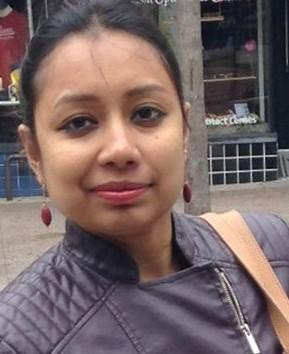
Research & Teaching Areas
I work in Women, Gender and Sexuality Studies. My area of interests include body studies (an emerging multidisciplinary field that focuses on bodily performances & embodiment, critical disability, race & environmental justice, interaction between organic bodies, nature & culture); Medical Humanities; Feminist Research Methodologies; Politics of Knowledge Formation; Migration and Diaspora Studies; Gender and Terrorism; Postcolonial Studies; and South Asian and Australian Cultural studies.
I teach courses in transnational feminist and queer theories and research methodologies; body narratives; intersectionality; cyborg feminism; immigration diaspora and globalization.
Methodologies I Specialize In
I practice multidisciplinary methodologies: from traditional critical analysis of textual and visual narratives, oral history, ethnographical field research, to non-traditional autobiographical story-telling, experiential and applied learning, and creative participation. I endorse decolonizing methodologies by questioning invisible power structures in research findings between the researcher and researched; challenging Western Eurocentric regimes; critically thinking diverse perspectives; encouraging personal experiences as a resource for academic inquiries; and involving consciousness raising process that engenders creativity and results in transformative community praxis.
Philosophy of Relationship with Graduate Studies
I see myself as a “facilitator” for graduate scholars to help them expand, transgress, cross, and bridge disciplinary, ideological, and cultural boundaries. I do not believe in didactic, one-dimensional power imbalance relationship between supervisor and supervisee. Apart from my formal responsibilities that include giving feedback on your work in progress, advising, and supporting additional academic opportunities, I believe in a mutual and reciprocal learning process where we evolve together to voice the difference, break the silence, and look for new possibilities.
How My Work Contributes to the World.
I call this ethical accountability in terms of what I teach, research, produce and advocate to scholars for contributing to the academic world and beyond. An example of my research in the field of body studies that contributes to social justice is an oral history archival project called Stories of Wisdom from Bodies in Separations (SWaBS): Archiving the Coronovirus Pandemic Through the Lens of Humanity. Supported by the National Endowment for the Humanities’ (NEH) CARES grant, this project built an archive that captured 100 diverse oral narratives from Duluth community members regarding their embodied experiences of the covid-19 pandemic.
As the principal investigator, one of my foci in the project was corporeal justice. In other words, how diverse human bodies when seen through the lens of race, ethnicity, gender, sexuality, age, disability, geographical adaptability, cultural practices, and under influence of economic and political policies, have different embodied experiences and how these multiplicity of experiences are represented in medicine, art, philosophy and in day to day stories of interaction.
An Example of Projects My Advisees Have Carried Out.
To cite one example: One of my students Bella Maki worked on a project on Labiaplasty, plastic surgery, and medical gaze thorough the lens of feminist research methodology and politics of knowledge formation. Bella is currently a medical student at Central Michigan University College of Medicine.
Where Do My Advisees Go?
My advisees have pursued doctoral degrees in Literature and Cultural Studies, Feminist Studies, and Postcolonial Studies. Some are working in various law firms, non-profit organizations, as consultants in domestic violence crisis centers, and disability awareness organizations. Some are pursuing careers in public health while others have exemplified leaderships in corporate world by showing skills in understanding consumer behavior through the lens of gender, sexuality, race and disability.
Qualifications & Limitations
- Dr. Das is willing to advise scholars with a feminist and social justice agenda matching her area of research interests and who have some initial background and experiences in social justice.
- Dr. Das will advise no more than two scholars at any time.
- Dr. Das is not available to supervise during summer when she focuses on her research and could be traveling because of that.
- Dr. Das will only supervise theses after the student has taken a course with her.
Questions Dr. Das will ask every Advisee
- Have you considered connecting the transdisciplinary field of Women, Gender and Sexuality Studies with Master of Professional Studies?
- What skills and experience can you bring to your research and creative project?
- How will you make a difference in terms of your scholarships and creativity?
- What are your long-term plans? Do you want to stay in academia or to join industry? How do you aim to achieve those plans?
Final Thoughts
Make sure that your hard-earned academic degree is directed towards the space for justice, spontaneous invention and holistic expansion and development of the community.
|
|